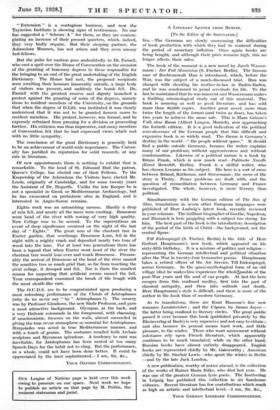A LITERARY LETTER FROM BERLIN. [To the Editor of the
SPECTATOR.] SIR,—The Germans are slowly overcoming the difficulties of book production with which they had to contend during the period of monetary inflation. Once again books are being bought, and although their price remains high, this no longer affects their sales.
The book of the moment is a new novel by Jacob Wasser- mann : Der Fall Maurizius (S. Fischer, Berlin). The famous case of Rechtsanwalt Hau is introduced, which, before the War, was the subject of a much-discussed trial. Hau was charged with shooting his mother-in-law in Baden-Baden, and he was condemned to penal servitude for life. To the last he maintained that he was innocent and Wassermann makes a thrilling criminological study out of this material. The book is amusing as well as good literature, and has sold more than 40,000 copies. Another great novel, more than twice the length of the former (and twice as dear), has taken two years to achieve the same sale. This is. Hans Grimm's Volk ohne Raum (Albert Langen, Munich), now approaching the fortieth edition. It is a good indication of the political convalescence of the German people that this difficult and expensive book is so widely read. The theme is Germany's destiny in the world—" the people without space." It should find a public outside Germany, because the writer explains many of our problems, without aggressiveness and without condemnation. Likewise of a political nature is a book by Bruno Frank, which is now much read—Politische Novelle (Ernst Rowohlt, Berlin). Frank is a skilful writer, who has chosen Locarno as his subject. His hero is a sort of cross between Briand,Rathenau, and Stresemann ; the scene of the story is Thoiry. Peace problems are dealt with, and the question of reconciliation between Germany and France investigated. The whole, however, is more literary than political.
Simultaneously with the German edition of The Son of Man, translations in seven other European languages were published of Herr Ludwig's latest book, recently reviewed in your columns. The brilliant biographer of Goethe, Napoleon, and Bismarck is here grappling with a subject too strong for him. The best part of the book is the introductory description of the period of the birth of Christ—the background, not the central figure.
Till Eulenspiegel (S. Fischer, Berlin) is the title of Herr Gerhart Hauptmann's new book, which appeared on his sixty-fifth birthday. It is a mixture of politics and religion— representing the German intellectual and political situation after the War in twenty-four hexameter poems. Hauptmann takes a retired officer of the Air Service, Till Eulenspiegel, across Germany. In the quasi-mythological form of an old village idiot he makes him experience the whole)jumble of the post-War years and the soul of our people. At last the hero escapes from this confused medley, first into the past of classical antiquity, and then into solitude and death. Herr Hauptmann's style is difficult, and there is more of the author in the book than of modern Germany.
As to translations, there are Knut Hamsun's fine new romance Landstreicher ; and the Ulysses, by James Joyce— the latter being confined to literary circles. The great public passed it over because this book (published privately by the Rheinverlag at Basle) is very expensive and not easy to obtain ; and also because its perusal means hard work, and little pleasure, to the reader. Those who want amusement without substance rely upon French literature, which apparently continues to be much translated, while on the other band, Russian books have almost entirely disappeared. English books are represented chiefly by Mr. Galsworthy ; American chiefly by Mr. Sinclair Lewis—who spent the winter in Berlin —and by the late Jack London.
A new publication, worthy of notice abroad, is the collection of the works of Rainer Maria Rilke, who died last year. He was one of the greatest German lyric poets. The Inselverlag in Leipzig has published this collection in six handsome volumes. Recent literature has few contributions which reach so high an artistic and intellectual level.—I am, Sir, &c., YOUR GERMAN LITERARY CORRESPONDENT.






























 Previous page
Previous page